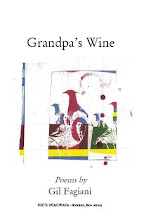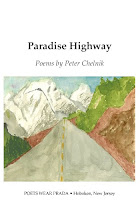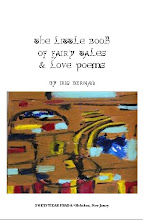 | |
| School for the Blind by Daniel Simpson Poets Wear Prada, 2014 |
Reprinted from Wordgathering: A Journal of Disability Poetry, Volume 8, Issue 4, December 2014, Book Reviews.
Book Review: School for the Blind (Daniel Simpson)
Reviewed by Kathi Wolfe
"I sat on a broad stone/And sang to the birds/The tune was God's making/But I made the words," Mary Carolyn Davies wrote in "The Day Before April," her poem from her volume Youth Riding (The Macmillan Company, 1919). In 1925, The Macmillan Company reprinted the poem in the popular children's reader Silver Pennies: A Collection of Modern Poems for Boys and Girls.It's superbly fitting that Daniel Simpson quotes this stanza from Davies' work in the poem "The Call of Poetry" in his stunning debut collection School for the Blind (Poets Wear Prada, 2014). With the musicality of a modern-day Homer and the wisdom of a contemporary Tiresias, Simpson in this slim, yet powerful volume takes us with him on his odyssey from "jumping on our twin mattresses" at four with his twin brother to being "left tonight/with his twin brother/at the boarding school" (a school "for the blind") to his musing, as an adult, "I don't know what a rainbow looks like/or that my life would be better if I could see one."
Simpson, a poet and musician, and his identical twin brother David were born blind in 1952. Dan attended the Overbrook School for the Blind from 1956 to 1966. After that, he became the first blind student in his Pennsylvania county to attend public school before earning a B.A. in English and music from Muhlenberg College, a master of Music in organ performance from Westminster Choir College and a Master of Arts in English from the University of Pennsylvania.
Making up words — "Lickington, Waggington…/names I made up/for the houses I passed" —enables him to both cope with and chronicle his institutionalized life — away from his family and home in the "school for the blind."
Simpson writes in the poem "The Call of Poetry" in the deceptively simple, short lines that so effectively evoke the homesickness, starkness and dehumanization of spending one's childhood in even the best "school for the blind" or other institutionalized setting.Chair, bed,
dresser in a dorm:
keep the rhythm running,
get from Sunday to Friday,
It's not that all schools for blind people were bad, or that students who were blind couldn't live happily and prosper academically in such places. I have friends, who attended schools for the blind in the mid-20th century, and look back upon this as one of the happiest periods of their lives. In the late 19th century, Helen Keller, who was deaf-blind, was saved from ignorance and isolation by her education at Perkins School for the Blind. Today, most blind and visually impaired children and teens attend the same schools as students without disabilities. Most schools now serve students who are not only blind but who also have other disabilities.
This having been said, many who grew up in schools for "the blind," (which were often state run and/or poorly funded) experienced stark living conditions as well as, at times, verbal, physical or sexual abuse. I know someone who, to this day, hates oatmeal because he was forced to eat it, at age 10, at a "school for the blind."
Too often, able-bodied people, even self-identified progressives, most likely out of ignorance, romanticize institutional settings for people with disabilities. Perhaps, they can't envision what it would be like to be taken from their home as a toddler and placed in such a setting — because this hasn't happened to them. Or, they assume that everyone who works in such places, is kind and caring toward those under their care.
Political poetry is so often devalued that I almost hesitate to say this: Simpson skillfully writes what Carolyn Forche has called "the poetry of witness." In poetry that calmly, but vividly packs a narrative punch, Simpson bears witness to the longings, betrayals, sadness and, at times callousness, of the school for "the blind." There is the misperception that political poetry is merely polemics dressed up as poems. As Simpson's work makes clear, this is far from the truth. In the hands of a talented poem, such as Simpson, the political begins with, and is entwined with the personal.
Take the poem "About Chester Kowalski I Don't Know Much." I don't want to reveal too much about Simpson's arresting, engaging, at times heartbreaking narrative. But these seemingly plain-spoken lines from the poem, mirroring the drabness of the school's dormitory and reflecting the rhythm of boys speech, tell more than any rant or policy paper about life at the "school for the blind":
One of the most harrowing stories of the impact of power, abuse and vulnerability is told in the prose poem "When the Chips Were Down." With a less skillful poem, this poem might have been a dull exercise in didacticism. In Simpson's telling, a lunch time hassle over potato chips is a quietly devastating tale of deprivation and cruelty. "What else they served for lunch that day in the boys' dining room, I can't say, but, dollars to doughnuts, whatever they passed off as nutrition was anything but," the narrative begins, "It could have been their infamous sausage that greased your shirt…Whatever it was, we'd have to count on the community bowl of potato chips…to carry us to dinner."…at night we breathed
the same fetid air of the open dorm
with thirty other eight to ten year-olds,
boys with healthy, shallow lungs who had played full tilt,
then said their prayers by rote —
"Now I lamey downda sleep."
Only one staff member, Mr. G, tries to intervene with the powers that be when the supply of chips on the dining room tables runs out. "It wasn't life or death. After all, it was just one replaceable man taking a losing and inconsequential stand," the narrator says after Mr. G. fails in his mission to replenish the chips.
Poetry is profoundly of the body, and the bodies of children, particularly, kids with disabilities, are vulnerable to sexual and other types of abuse. Several of the poems in School for the Blind speak to this. "A long day of hiking, and now the man/rubs alcohol on the backs of the boy's legs," Simpson writes in the poem "Boy Scout Friend," "…The boy can't sleep;/it's those kisses on the lips."
If a person is blind, people frequently think that they want to be "healed" or that they spend all of their time lamenting that they can't see. As someone who's legally blind, I've often encountered (usually, well-meaning) people who believe that, if I pray more, in the after-life, I'll, at last, be happy, and have 20/20 vision. Simpson deflects this trope with wit. Without being anti-spirituality or against religion, he wittily offers a new vision of God and of eternity.
Without being sentimental or white-washing the darkness of life at the "school for the blind," Simpson's work displays generosity and compassion toward those who were mean-spirited or behaved inappropriately. In the poem "The Luxury of Being Children," the narrator recalls Miss Walters, a cold-hearted dorm mother who "…when we said, 'Good morning,' …responded, 'What's good about a morning with you!'"I'm thinking the next time I see Aunt Polly,
I'm going to tell her about my new vision:
"It's really going to be something," I'll say.
"In Heaven, you'll finally get to be blind."
Yet years later, after he'd left the school for the blind and was in his senior year in high school, his hateful feelings toward Miss Walters, who'd retired, evolved. "A friend called to ask if I'd heard the story: / in a cheap apartment, alone, she froze to death."
School for the Blind is filled with the sexual and romantic yearnings of the narrator as he emerges from boyhood to adolescence and into adulthood. But, the most heartfelt love story in the collection is that of Simpson's love for his brother. "Sometimes as you well know,/I still can plow ahead, forget to call you,/but then something slaps me up against your absence,/and I'm stopped, that newborn baby boy again,/listening for you," Simpson writes in the touching conclusion of the poem "A Letter to My Twin Brother."
Simpson is an emerging and important voice that brings new vision to the disability poetics movement. School for the Blind is a stirring book that will become an indelible part of your memory and DNA.

































































